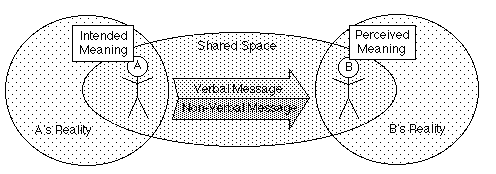| Wednesday, November 26, 2003 |
| What I hear you say ... |
 One of the most simple and useful ways of sorting out arguments and communication difficulties is to work on getting clear on what people really were trying to say. Most conflicts are merely rooted in misunderstandings. Most communications that one takes offense to weren't really meant the way the were received. Words are so imprecise, even when we think they're not. We don't all attach the same meanings to the same words. A word is just a pointer. What it points to for each of us depends on our experience and our assumptions. So, the simple exercise to do before you start fighting back is to read back in your own words the meaning you thought you received. "What I hear you say is that ...And very often you'll find that you didn't get it right at all, but the person really meant something else than what you thought. Even if you get confirmed that the person actually was being a bit mean and trying to put you down, the clarification makes it so much easier to respond appropriately. The truth tends to free things up. There's a very recognizable feeling of relief that takes place when two or more people suddenly realize that they're understanding each other, and then they actually can look at the subject matter together. Even if it turns out that they don't agree or see things the same way at all. We don't have to agree. But it helps greatly when we understand each other. For more details, try this Communication Model. [ Information | 2003-11-26 09:44 | 15 comments | PermaLink ] More > |
| Who's Winning the War on Terrorism? |
Excellent article about the "war" on terrorism from Harlan Cleveland. Harlan is an experienced statesman, and I've heard him speak at the World Future Society's conferences. He thinks clearly about things."Terrorism is not a doctrine, like President Harry Truman’s declaration that the United States would protect Greece and Turkey from Soviet takeover. It’s not a purpose, like the postwar recovery of Western Europe assisted by the four-year Marshall Plan. It’s not a deadly disease like AIDS or a chronic condition like poverty, on which metaphorical wars have been declared.And he goes on to explain very well the self-contradictions inherent in trying to have a war against something like that. And what should be done instead. [ Politics | 2003-11-26 15:25 | 4 comments | PermaLink ] More > |